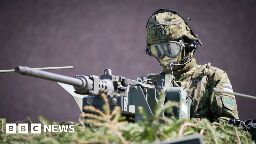Ukraine war: We have no Plan B if Ukraine falls, Estonian PM says



bbc.com
Estonia considers itself a front-line state, a Nato member where its border guards stare across the Narva River at the Russian fortress of Ivangorod.
This tiny Baltic state, once a part of the Soviet Union, is convinced that once the fighting stops in Ukraine, President Vladimir Putin will turn his attention to the Baltics, looking to bring countries like Estonia back under Moscow’s control.
To help stave off that possibility, Estonia’s government has poured money and weapons into Ukraine’s war effort, donating more than 1% of its GDP to Kyiv.
You are viewing a single comment
WTF? I sincerely don't understand why you're so averse to what I'm saying. I'm not anti-NATO by any means — I'm only stating a fact that I thought would be very cut and dry.
https://www.nato.int/cps/en/natohq/topics_110496.htm
Where does it say it’s voluntary?! And, again, you need to take it in line with literally every other treaty in effect, which emphasizes the ways that defense works.
It can’t be automatic because US domestic laws prohibit the president from declaring war without congressional approval, not because taking part in a defensive pact is somehow optional. And, again, sovereignty is baked into all international laws, especially those having to do with the United States (it’s always been really serious about maintaining this more or less absolutely).
You’re stating a “fact” that’s incorrect, and works in the interest of countries that would benefit a great deal from a lack of adherence to Article 5. Stop it. If any country decided to not participate when Article 5 is invoked, the alliance would end. It’s quite literally the cornerstone of the whole deal.
Edit: I went ahead and found another source that explains what I have been saying: https://www.jstor.org/stable/resrep10238
What the action is, is indeed ambiguous, not the requirement to take action, which is not.
I truly hope you're right! I'm doubtful, but I do hope so.
You should trust the words of experts, then, and make sure that you put pressure on your government to adhere to the text of the treaty rather than trying to inject doubt about it.
https://www.jstor.org/stable/resrep10238